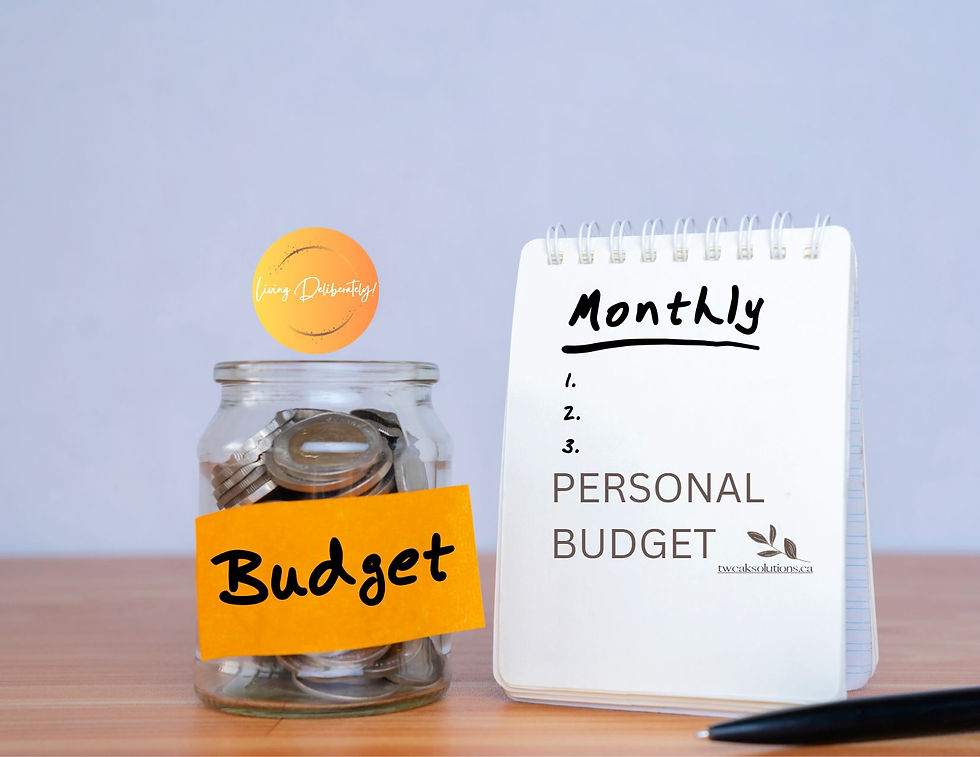
MANAGING YOUR FINANCES
Creating a personal budget is an important step in managing your finances effectively.
It helps you track your income, expenses, and savings, allowing you to make informed decisions about your money.
Here's a step-by-step guide to help you create a personal budget:
1. Determine your income: Start by calculating your total monthly income. This includes your salary, wages, freelance income, rental income, and any other sources of money you receive regularly. If your income varies each month, take an average or use your lowest estimated income to ensure your budget remains realistic.
2. Track your expenses: Track your expenses for a month or two to get an accurate picture of where your money is going. Categorize your expenses into different groups, such as housing, transportation, groceries, entertainment, debt payments, utilities, etc. Use bank statements, receipts, and financial apps to help you gather this information.
3. Set financial goals: Determine your short-term and long-term financial goals. These could include saving for emergencies, paying off debt, saving for a vacation, or investing for retirement. Having specific goals in mind will help you allocate your money accordingly.
4. Calculate fixed expenses: Identify your fixed expenses, which are regular expenses that don't change much from month to month. These typically include rent or mortgage payments, insurance premiums, loan payments, subscription services, etc. Write down the amount for each fixed expense.
5. Calculate variable expenses: Variable expenses are those that fluctuate from month to month, such as groceries, dining out, entertainment, transportation costs, and clothing. Review your tracked expenses from step 2 to determine an average monthly amount for each variable expense.
6. Determine savings amount: Decide how much you want to save each month. Experts often recommend saving at least 20% of your income, but you can adjust this based on your financial goals and circumstances. Set aside a portion of your income for savings as a fixed expense in your budget.
7. Subtract expenses from income: Subtract your total expenses (fixed and variable) and savings from your monthly income. Ideally, you should have money left over after accounting for all expenses and savings. If your expenses exceed your income, you'll need to reevaluate your budget and find areas to cut back.
8. Adjust your spending: If you find that your expenses are higher than your income or you want to save more, you may need to make adjustments. Look for areas where you can reduce spending, such as dining out less, cutting back on entertainment, or finding cheaper alternatives for certain expenses. Allocate the freed-up money to savings or paying off debts.
9. Monitor and review: Keep track of your budget as the month progresses. Review your actual spending against your budgeted amounts regularly. This will help you identify areas where you might be overspending and make adjustments as needed.
10. Be flexible: Budgeting is an ongoing process, and it may take time to find the right balance. Be flexible and willing to make changes as your financial situation and goals evolve.
Remember, budgeting is a tool to help you manage your money effectively, so it's essential to stick to your budget as closely as possible. However, don't be too hard on yourself if you deviate occasionally. The goal is to develop good financial habits and work towards your long-term goals.
Adrienne Ashworth is a high energy, holistic, trans-formational Life Coach who helps women prioritize their well-being and take action with profound and sustaining results through her flexible coaching program Women Living Deliberately(TM).
She opened Tweak Solutions Inc in 2018 but has been coaching & empowering women since 2004. She is a member and accredited ICF Life Coach who provides coaching remotely from her office in BC, Canada.
Schedule a consultation or take her instant online Well-being Self-Assessment to embark on your holistic, trans-formative journey where you will prioritize your well-being in all area's of your life.
Start living deliberately today!

Comments